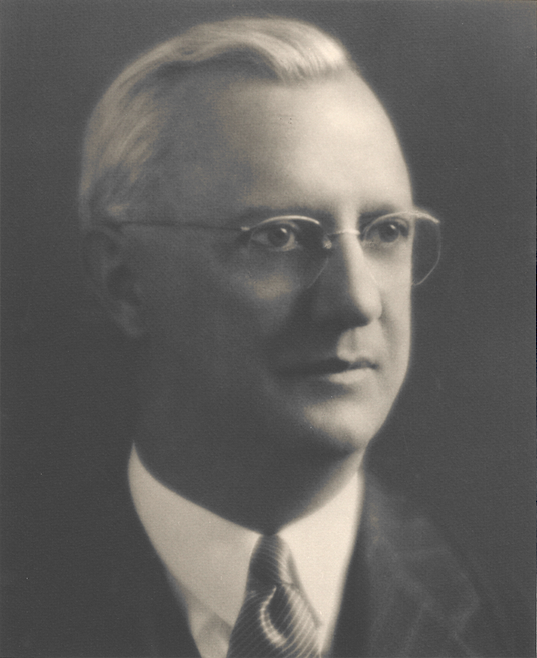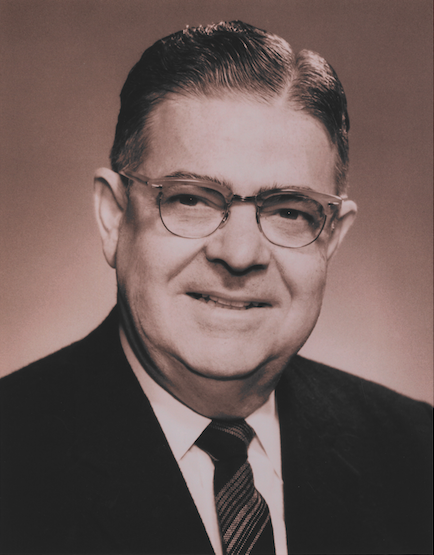1927 - 1942: James D. Bruce, MD

James D. Bruce, MD, served as the first director of the Department of Postgraduate Medicine from 1927-1942. Beyond this role, Dr. Bruce served in various other capacities including: Vice-President of the University of Michigan, in charge of University Relations, Medical Adviser to the Health Service, and appointed Chairman of the newly-established Division of Health Sciences.
Dr. Bruce was a graduate of the Detroit College of Medicine and Surgery whose early medical practice was in Shiawassee County. He had a somewhat brief association with the University of Michigan Medical School, which began in 1901, in the Department of Internal Medicine. A period of private practice in Saginaw was interrupted by WWI service in British and American Medical units. In 1925, when he returned to University of Michigan it was as Director of the Department of Internal Medicine and Chief of the Medical Service. His labors in the development of a Department of Postgraduate Medicine were later rewarded by appointment to the directorship.
1942 - 1954: Howard H. Cummings, MD

Howard H. Cummings, MD, served as the second director of the Department of Postgraduate Medicine. Prior to his appointment, Dr. Cummings served as the assistant director from 1936-1942.
Dr. Cummings graduated from the University of Michigan Medical School in 1910 and began his post graduate work at Johns Hopkins. Soon after, he was hired back at the University Hospital as an assistant in the Obstetrics and Gynecology department, followed by an instructor position from 1911-1913. In 1913 Dr. Cummings was appointed the first director of the University Health Service, a post in which he served until resigning in October 1917 to take up general practice.
1954 - 1967: John M. Sheldon, MD

John M. Sheldon, MD, served as the third Director of the Department of Postgraduate Medicine and Chief of the Allergy Division at the University of Michigan Medical Center.
Dr. Sheldon began his career at the University of Michigan as an intern in 1932 and remained during his residency. He rose through the academic ranks to become a full Professor of Internal Medicine in 1950, finally serving as director from 1954-1967.
At the time of his death in 1967, Dr. Sheldon was one of only three physicians in the hospital’s 100-year history to rise from intern to the governing Board of Directors. In January 1967, he was named to Michigan Health Council’s “Health Hall of Fame.” In honor of his significant contributions to the field of Allergy and Clinical Immunology. The John M. Sheldon Allergy Society was formed in 1966 by 75 doctors whom received their specialty training from him. The society continues today with 180 members as of 2019.
1967 - 1971: Harry A. Towsley, MD

Harry A. Towsley, MD, served as the fourth Director of the Department of Postgraduate Medicine. Prior to his role as director, he served as assistant director under Dr. Sheldon from 1954-1967.
In 1931 he earned his medical degree from the University of Michigan. His training included stints as a rotating intern and assistant resident at the University Hospital, 1931-1933, and resident in the Department of Pediatrics and Communicable Diseases 1933-1934, where he was then appointed instructor and eventually became assistant professor in 1941. Dr. Towsley’s career was interrupted by military service during WWII where he served in England, France and Belgium from 1942-45. Upon his return to the University of Michigan, he served as associate professor of Pediatrics and Communicable Diseases and Department of Postgraduate Medicine, directing a newly developed program of decentralized graduate medical instruction and coordinating extramural activities.
In 1960, Dr. and Mrs. Towsley established the Harry A. and Margaret D. Towsley Foundation. The foundation’s significant donations to the University of Michigan include the Towsley Center for Continuing Medical Education, gifts to the Wiley T. Buchanon Research Fund and the Kellogg Eye Center.
1971 - 1974: Neal A. Vanselow, MD

Neal A. Vanselow, MD, served as chairman of the department from 1971-74. During Dr. Vanselow’s first year, the department went under a major program review, which resulted in the significant expansion, restructure and name change to the Department of Postgraduate Medicine and Health Professions Education. These new changes encouraged teaching activities to be expanded to affiliated community hospitals, undergraduate medical student teaching and continuing education for health professionals, along with research focused on teaching, learning and evaluation of health services.
Dr. Vanselow received his MD from the University of Michigan in 1958. He completed his internship at the Minneapolis General Hospital before returning to the University of Michigan for residency and a fellowship in immunology and allergy. Upon completion of his fellowship, and receiving his master’s in Internal Medicine in 1963, he became faculty member of the Department of Internal Medicine.
After serving as Chairman for Postgraduate Medicine, Dr. Vanselow served as Dean of the University of Arizona College of Medicine (1974-77), Chancellor of the University of Nebraska Medical Center (1977-82), Vice President of the Academic Health Center at the University of Minnesota (1982-89), and in his final role as Chancellor of Tulane University Medical Center (1989-97). In 2018 Dr. Vanselow was presented with an Albert Nelson Marquis Lifetime Achievement Award.
1974 - 1980: William R. Harlan, MD

William R. Harlan, MD, served as Chair for the Department of Postgraduate Medicine and Health Professions Education from 1974-1980. During his tenure the department celebrated its 50th anniversary along with supporting and teaching over 7,000 physicians and medical students.
Dr. Harlan received his MD from the Medical College of Virginia in 1955 and completed his residency in internal medicine at Duke University Hospital in 1961. He served as professor of medicine and community health services as well as director of the Clinical Scholars program at Duke until 1974.
At University of Michigan he followed his tenure as Department of Postgraduate Medicine and Health Professions Education chair by becoming Chief of U-M Internal Medicine Service at Westland Medical Center (1980-86). His next role was as Assistant Dean of the Medical School in 1986. Dr. Harlan studied hypertension and nephrology and was one of the first to describe a correlation between lead exposure and high blood pressure.
In 1987, Dr. Harlan became director of the Division of Epidemiology and Clinical Applications at the NHLBI (National Heart, Lung and Blood Institute) and in 1991 was named associate director for the Office of Disease Prevention, National Institutes of Health (NIH). Before retiring in 2001 from the government, he also developed and served as interim director for both the National Center for Complementary and Alternative Medicine and Office of Dietary Supplements at the NIH.
1980 – 2003: Roland G. Hiss, MD

Roland "Red" Hiss served as chair from 1980 – 2003 (80-81 as interim). He attended the University of Michigan, where he received both his BS and MD degrees in 1955 and 1957, respectively. Following an internship at Philadelphia General Hospital (1957-58), service in the US Air Force (1958-61), and a residency (1961-64) and hematology fellowship (1964-65) at the University of Michigan, he became an assistant professor of internal medicine at the University of Michigan in 1966.
From there he became an assistant professor in the Department of Postgraduate Medicine and Health Professions Education (renamed Medical Education in 1995 and Learning Health Sciences in 2013) and later served as Department Chair and Professor of Medical Education until retiring in 2003. As chair, he strived to make continuing medical education of healthcare professionals as systematic and effective as classroom and clinical training of students and residents. In 2002, the University of Michigan Medical School awarded him the Lifetime Achievement in Medical Education Award.
Along with practicing hematology, Dr. Hiss was passionate about improving diabetes care by translating research findings into community-based care for diabetes. He served as Chief of the Demonstration and Education Division and Director of the Continuing Education and Outreach Core at the Michigan Diabetes Research and Training Center. At the national level, for the National Institutes of Health, he served on the Steering Committees of the National Diabetes Advisory Board for Patient Education Initiatives and the National Diabetes Education Program.
In 2018, the Department of Learning Health Sciences hosted its first Roland "Red" Hiss Lectureship to remember his contributions to medical education.
2003 - 2014: Larry D. Gruppen, PhD
Larry D. Gruppen, PhD, served as the Josiah Macy Jr. Professor of Medical Education and Chair of the Department of Medical Education from 2003- 2014. Since 2014, Dr. Gruppen has served as a professor of Learning Health Sciences and founding Director of the Masters in Health Professions Education program.
Dr. Gruppen completed his PhD from the University of Michigan in 1987 and has served in various capacities in the department since: Research Investigator/Scientist (87-97), Associate Professor (97-00) and Director of MESP (97-07), and finally Professor (00-present).
Beyond his work at the University of Michigan, he has held the offices of president of the Society of Directors of Research in Medical Education and chair of the Association of American Medical College's (AAMC) Central Group on Educational Affairs. He was also the founding Chair of the AAMC's Medical Education Research Certificate (MERC) program.
2014 – Present: Charles P. Friedman, PhD

Charles Friedman became Chair and Josiah Macy Jr. Professor of Medical Education in 2014 when the department became a basic science department, expanded its mission and was renamed the Department of Learning Health Sciences. Under Dr. Friedman’s leadership, the department transformed into a “first in the nation” medical school academic department dedicated to the sciences of learning at all levels from learning by individuals, to learning by teams and organizations, and learning by ultra-large scale systems, such as entire nations. As a result, the first-of-its-kind MS/PhD program was created, the Health Infrastructures and Learning Systems (HILS) program
Prior to coming to DLHS, Dr. Friedman helped create the Masters of Health Informatics Program at the University of Michigan through the joint partnership of the School of Information and the School of Public Health. Additionally, he spent many years working at the Office of the National Coordinator for Health IT (ONC) where he served as Deputy National Coordinator and Chief Scientific Officer. In addition to advancement of the Learning Health System, his work promoted several IT innovations including SMART Health IT, an open, standards-based technology platform. He was lead author of the nation’s first health IT strategic plan. Prior to these executive positions at ONC, Friedman was associate vice chancellor for Biomedical Informatics and founding director of the Center for Biomedical Informatics at the University of Pittsburgh.
Dr. Friedman holds a Bachelor’s and Master’s of Science in physics from the Massachusetts Institute of Technology, a PhD in education from the University of North Carolina-Chapel Hill and has done post-graduate studies in medical information science at Stanford University.

